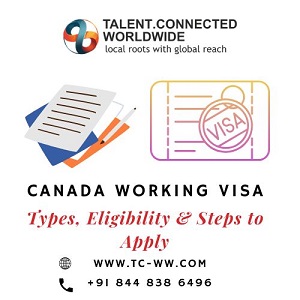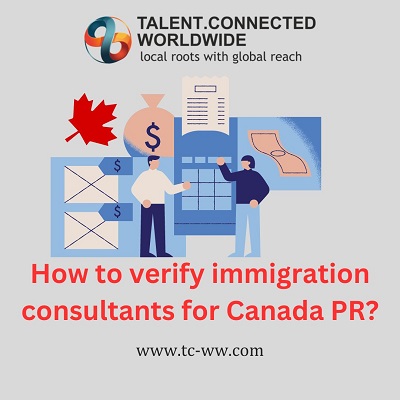Canada Working Visa: Types, Eligibility & Steps to Apply

Strong 8k brings an ultra-HD IPTV experience to your living room and your pocket.
Canada is one of the most attractive destinations for skilled workers worldwide due to its robust economy, excellent work opportunities, and diverse cultural environment. Securing a Canada Working Visa opens doors to countless professional and personal growth opportunities. This guide will provide an in-depth look into the types of Canadian work visas, eligibility requirements, and the application process.
Types of Canada Working Visas
Canada offers several work visa types to cater to different needs and employment situations. Understanding these categories will help you determine the right visa for your career goals.
1. Temporary Work Permit
This visa allows individuals to work in Canada for a specific employer and duration. It is typically issued for jobs offered by Canadian employers who have obtained a Labour Market Impact Assessment (LMIA), proving no local workers can fill the position.
- Employer-Specific Work Permit: Tied to a specific employer and job.
- Open Work Permit: Not employer-specific, allowing you to work for any eligible employer in Canada.
2. International Mobility Program (IMP)
The IMP allows employers to hire workers without the need for an LMIA. It focuses on promoting cultural and economic exchange.
- Examples include Intra-Company Transfers, Post-Graduation Work Permits (PGWP), and Spousal Open Work Permits.
3. Global Talent Stream
This program is part of the Temporary Foreign Worker Program (TFWP) and is designed for highly skilled workers in tech or other in-demand sectors. It offers expedited processing, often within two weeks.
4. Work Permits through International Agreements
Work permits issued under agreements like CUSMA (formerly NAFTA) allow citizens of the U.S. and Mexico to work in Canada without an LMIA.
5. Working Holiday Visa
Available under the International Experience Canada (IEC) program, this visa is ideal for young individuals (18-35 years) from participating countries, allowing them to work while traveling in Canada.
Eligibility for a Canada Working Visa
Before applying, ensure you meet the following general eligibility requirements:
1. Job Offer
Most work permits require a valid job offer from a Canadian employer. Employers may also need an LMIA approval.
2. Language Proficiency
While not mandatory for all work permits, demonstrating proficiency in English or French can be advantageous, especially for skilled positions.
3. Proof of Funds
Applicants must show sufficient funds to support themselves and their family members (if applicable) during their stay.
4. Qualifications
Your education, skills, and work experience must align with the job requirements in Canada.
5. Health and Security Clearances
- Medical Examination: You may need to pass a medical exam to prove good health.
- Police Clearance Certificate: A background check to confirm you have no criminal record.
6. Compliance with Immigration Laws
You must intend to leave Canada once your work permit expires unless you transition to permanent residence.
Steps to Apply for a Canada Working Visa
Step 1: Determine the Right Work Permit
Identify the most suitable work permit type based on your job offer, qualifications, and personal circumstances. For employer-specific permits, confirm if the employer has completed the LMIA process if required.
Step 2: Gather Required Documents
Prepare all necessary documents, which typically include:
- A valid passport
- Job offer letter from a Canadian employer
- LMIA approval (if required)
- Educational certificates
- Proof of work experience
- Financial statements
- Language proficiency test results (if applicable)
- Police clearance certificate and medical exam results
Step 3: Submit Your Application
Work permits can be applied for either online through the IRCC (Immigration, Refugees and Citizenship Canada) portal or at a visa application center (VAC) in your country. Online applications are faster and easier to track.
Step 4: Biometrics and Fees
After submitting your application, you will receive instructions to provide biometrics (fingerprints and photos). Pay the processing fee, which varies by visa type:
- Employer-specific work permit: CAD 155
- Open work permit: CAD 155
- Biometrics fee: CAD 85
Step 5: Wait for Processing
Processing times for Canadian work permits depend on the country of residence and work permit type. Use the IRCC processing time tool to estimate your wait time.
Step 6: Receive Decision
If approved, you will receive a Port of Entry (POE) letter. Bring this letter along with other required documents when traveling to Canada.
Step 7: Start Working in Canada
Upon arrival in Canada, present your POE letter to the immigration officer at the airport. Once verified, your work permit will be issued.
Transitioning from Work Visa to Permanent Residency
Many individuals who come to Canada on a work visa eventually transition to permanent residency (PR). Popular pathways include:
- Express Entry Program
- Provincial Nominee Programs (PNPs)
- Canadian Experience Class (CEC)
Working in Canada gives you valuable work experience, which can increase your CRS (Comprehensive Ranking System) score under Express Entry or make you eligible for a PNP.
Conclusion
Obtaining a Canada Working Visa is a gateway to endless opportunities. By choosing the right visa type and following the proper application steps, you can embark on a successful career in one of the most prosperous countries in the world. Take the time to carefully plan your move and explore options to transition to permanent residency for long-term benefits.
Note: IndiBlogHub features both user-submitted and editorial content. We do not verify third-party contributions. Read our Disclaimer and Privacy Policyfor details.




